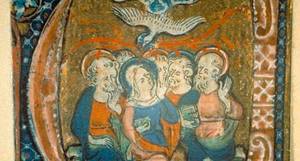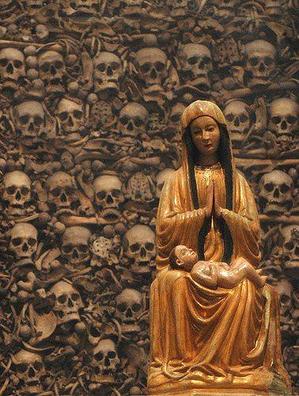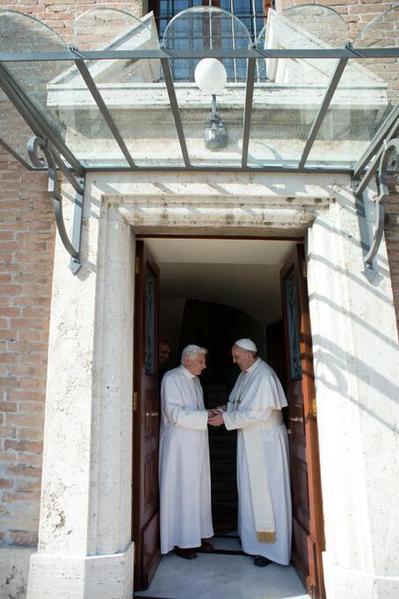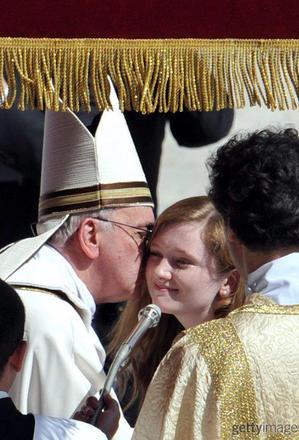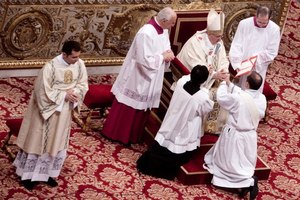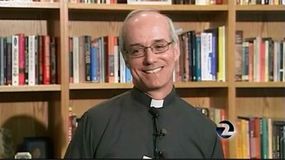 Jesuit Father Alfonso José Gomez met his first Jesuit in 1979 who later turned out to be his religious superior in Argentina; with the passage of time this Jesuit became a bishop, and now pope, Father Jorge Mario Bergoglio (bishop) now Pope Francis. Many of us are still interested to know more about the man who sits in the Chair of Peter. The Indian Jesuit journal Jivan published an interview with Father Gomez conducted by Father John Rose, SJ.
Jesuit Father Alfonso José Gomez met his first Jesuit in 1979 who later turned out to be his religious superior in Argentina; with the passage of time this Jesuit became a bishop, and now pope, Father Jorge Mario Bergoglio (bishop) now Pope Francis. Many of us are still interested to know more about the man who sits in the Chair of Peter. The Indian Jesuit journal Jivan published an interview with Father Gomez conducted by Father John Rose, SJ.
Category: Pope Francis
Only the Spirit can awaken diversity
Pentecost is a difficult feast for some people. The Holy Spirit is sometimes called forgotten member of the Godhead. It takes a lot of time to understand what it means to live by the Spirit, to be sustained by the Spirit, to be set in motion by the Spirit for the good of all. There is a creative tension with the Holy Spirit: a genuine freedom for something and being in harmony, in unity with all others, even when it rubs me the wrong way. Here, let’s agree that freedom means something along the lines as adhering to what God wants for us, that is, seeking out our destiny. It certainly doesn’t mean licentiousness. As the Pope points out in the paragraph I cited below, the Holy Spirit is awakens in me the reality of unity and not uniformity. And there is the rub for many: how do I live with unity and not get consumed by an ideology of uniformity? Many can’t fathom living with a diversity of belief and practice of the faith. Here I am thinking how the gospel has been inculturated in the East and the West. For example, the rule of law in Eastern Christianity is different on many levels than it is in the Western form of Christianity. When we live parallel lives to that of the Church, or a life that dismisses the diversity of gifts, we can say with confidence that we are not living with the Spirit’s guidance.
…the Holy Spirit would appear to create disorder in the Church, since he brings the diversity of charisms and gifts; yet all this, by his working, is a great source of wealth, for the Holy Spirit is the Spirit of unity, which does not mean uniformity, but which leads everything back to harmony. In the Church, it is the Holy Spirit who creates harmony. One of Fathers of the Church has an expression which I love: the Holy Spirit himself is harmony – “Ipse harmonia est”. Only the Spirit can awaken diversity, plurality and multiplicity, while at the same time building unity. Here too, when we are the ones who try to create diversity and close ourselves up in what makes us different and other, we bring division. When we are the ones who want to build unity in accordance with our human plans, we end up creating uniformity, standardization. But if instead we let ourselve be guided by the Spirit, richness, variety and diversity never become a source of conflict, because he impels us to experience variety within the communion of the Church. Journeying together in the Church, under the guidance of her pastors who possess a special charism and ministry, is a sign of the working of the Holy Spirit. Having a sense of the Church is something fundamental for every Christian, every community and every movement. It is the Church which brings Christ to me, and me to Christ; parallel journeys are dangerous! When we venture beyond (proagon) the Church’s teaching and community, and do not remain in them, we are not one with the God of Jesus Christ (cf. 2 Jn 9). So let us ask ourselves: Am I open to the harmony of the Holy Spirit, overcoming every form of exclusivity? Do I let myself be guided by him, living in the Church and with the Church?
Pope Francis
Homily for Pentecost, excerpt
19 May 2013
Responding to the mystery of the living God as beggars of faith
A person with certitude in someone or something is going to propose that you consider making an inquiry into what is the cause of your certainty and hope. Naturally we will want to share with others and to deepen within ourselves a reality that blossoms as a beautiful new flower. The draw of that flower is no mere superficial thing: there is hope, beauty, expectation, communication, an essentiality that is unique. This is the role of the Pope who gives good example and daily tells us the cause of his joy and hope in being a friend of Jesus Christ. He encourages to look deeper into our faith in Christ and not to settle for less than what has been offered, that is, everything.
“Being Christian is not just obeying orders but means being in Christ, thinking like Him, acting like Him, loving like Him; it means letting Him take possession of our life and change it, transform it and free it from the darkness of evil and sin” (Pope Francis, General Audience, April 10, 2013).
The head of the ecclesial movement, Communion and Liberation, Father Julián Carrón reflects on what it means to be a Christian today with the help of the new pope in L’Osservatore Romano (18 May 2013), in “As Beggars of Faith.” It is a brief reflection on what he sees going on with Pope Francis leading the Church as he meets with the Church’s many ecclesial movements.
The text of Father Carrón’s reflection is here: JCarrón As Beggars of Faith.pdf
802 new saints reflect the the glory of Love
Today the Church has 802 new saints, 800 of them are the martyrs of Otranto. This group of canonized were martyrs while you may say that Laura Montoya (aka, Lupita) and Maria Guadalupe García Zavala were “ordinary saints.” These are the first canonizations done by Pope Francis.
What catches our eyes that in one swoop 800 are recognized as martyr saints. Their history tells us that Ottoman soldiers invaded a Christian village town in 1480; the villagers were killed for refusing to convert to Islam, in fact, beheaded because they refused to renounce their Catholic faith.
The wall of skulls of the martyrs of Oltranto (note the picture) displayed prominently in Otranto Cathedral (Apulia region of Italy). These are the human remains, the relics of holy men and women; our new intercessors before the throne of Grace.
The year was 1480 and the fateful day when a fleet of 70 to 200 Ottoman Turks ships reached the city of Otranto, then part of the Kingdom of Naples. The Turkish forces were led by Gedik Ahmed Pasha.
July 28 marks the beginning of the Ottoman wars (1453-1683) in Europe; Mohammed II had invader and conquered Constantinople just 28 years earlier. On August 12, 800 people of Otranto, Antonio Primaldo and his companions were taken to the hill of Minerva, now called the Hill of the Martyrs, and slaughtered for being faithful to Jesus Christ and His Church.
The Church’s precess of investigating the circumstances and holiness of these people began in 1539 and end on 14 December 1771 with the beatification of the people of Oranto by Pope Clement XIV. Benedict XVI issued a decree on 6 July 2007, stating that out of hatred for the faith these Catholics were killed. Therefore, certifying that martyrdom happened and therefore saints.
The Pope homily is here:
In this seventh Sunday of Easter we are gathered to celebrate with joy a feast of holiness. Thanks be to God who has made His glory – the glory of Love – to shine on the Martyrs of Otranto, on Mother Laura Montoya and María Guadalupe García Zavala. I greet all of you who have come to this celebration – from Italy, Colombia, Mexico, from other countries – and I thank you! Let us look on the new saints in the light of the Word of God proclaimed: a Word that invited us to be faithful to Christ, even unto martyrdom; a word that recalled to us the urgency and the beauty of bringing Christ and his Gospel to everyone; a word that spoke to us about the witness of charity, without which even martyrdom and mission lose their Christian savor.
Continue reading 802 new saints reflect the the glory of Love
Francis and Ignatius – saints who rebuilt the Church
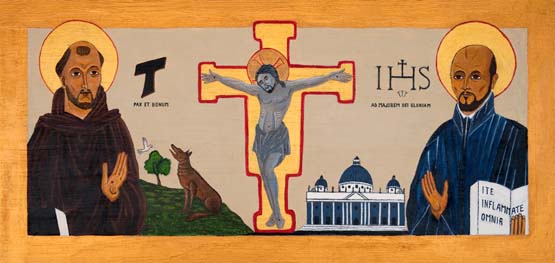
I read this narrative in one of the newsletters I receive. Very curious on these things work out, no?
When the parish priest of a beautiful village of Provence, South of France, asked in January for a new work of art for his parish, he couldn’t imagine that his command would meet the joyful events of the whole church, and of the Society. As this diocesan priest was very close to the Franciscans, and to the Jesuits, he asked a parishioner to create a drawing of St Ignatius and St Francis, and another to transform it in a wood bas relief for his parish. The project was going on, when the new pope, a Jesuit, decided to call himself Francis. This drawing had suddenly a more universal signification, and the artist transformed it also into an icon. Every Jesuit will be able to read it and to appreciate its symbols.
2 Popes at the Vatican, a first in history
Pope Francis’ prayer intentions for May 2013
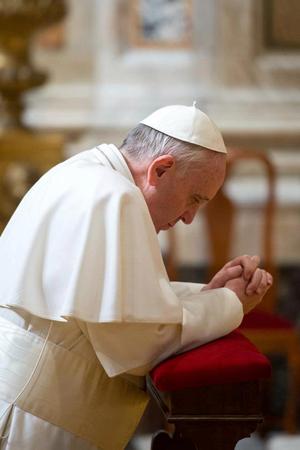 Blessed Teresa of Calcutta once said, “Prayer is not asking. Prayer is putting oneself in the hands of God, at His disposition, and listening to His voice in the depths of our hearts.”
Blessed Teresa of Calcutta once said, “Prayer is not asking. Prayer is putting oneself in the hands of God, at His disposition, and listening to His voice in the depths of our hearts.”
The Spirit changes us
At the Sacrifice of the Mass in St Peter’s Square, Pope Francis also celebrated the Rite of Confirmation with 44 people from around the world. As we approach Pentecost, this excerpt from his short homily is very instructive. Pay attention. Don’t forget to daily ask, no beg, for the Holy Spirit to have a special grace to embrace the day. May the Spirit be with these 44 newly confirmed in the Faith, indeed, all those around the world who are receiving the sacrament of Confirmation these days.
This is the work of the Holy Spirit: he brings us the new things of God. He comes to us and makes all things new; he changes us. The Spirit changes us! And Saint John’s vision reminds us that all of us are journeying towards the heavenly Jerusalem, the ultimate newness which awaits us and all reality, the happy day when we will see the Lord’s face – that marvelous face, the most beautiful face of the Lord Jesus – and be with him for ever, in his love.
You see, the new things of God are not like the novelties of this world, all of which are temporary; they come and go, and we keep looking for more. The new things which God gives to our lives are lasting, not only in the future, when we will be with him, but today as well. God is even now making all things new; the Holy Spirit is truly transforming us, and through us he also wants to transform the world in which we live. Let us open the doors to the Spirit, let ourselves be guided by him, and allow God’s constant help to make us new men and women, inspired by the love of God which the Holy Spirit bestows on us! How beautiful it would be if each of you, every evening, could say: Today at school, at home, at work, guided by God, I showed a sign of love towards one of my friends, my parents, an older person!
Pope Francis: cannot believe in Jesus without the Church
In the Pauline Chapel in Apostolic Palace, Pope Francis offered Mass with some of the cardinals on the feast of Saint George, the name day of the Pope, Saint George. There are several stellar points made the Pope noted below with my emphasis. In these days when one’s identity as a Christian is questioned, or even rejected for superficial reasons, I think that if you consider what the Church teaches, especially through the eyes of Pope Benedict and now through Pope Francis, you will notice the truth, not ideology, joy, not grumpiness. The Pope uses another previous pope to help him and us to understand the work of the Church –her mission– under the power of the Holy Spirit.
The [first] reading today makes me think that the missionary expansion of the Church began precisely at a time of persecution, and these Christians went as far as Phoenicia, Cyprus and Antioch, and proclaimed the Word. They had this apostolic fervor within them, and that is how the faith spread! Some, people of Cyprus and Cyrene – not these, but others who had become Christians – went to Antioch and began to speak to the Greeks too. It was a further step. And this is how the Church moved forward. Whose was this initiative to speak to the Greeks? This was not clear to anyone but the Jews. But … it was the Holy Spirit, the One who prompted them ever forward … But some in Jerusalem, when they heard this, became ‘nervous and sent Barnabas on an “apostolic visitation”: perhaps, with a little sense of humor we could say that this was the theological beginning of the Doctrine of the Faith: this apostolic visit by Barnabas. He saw, and he saw that things were going well.
And so the Church was a Mother, the Mother of more children, of many children. It became more and more of a Mother. A Mother who gives us the faith, a Mother who gives us an identity. But the Christian identity is not an identity card: Christian identity is belonging to the Church, because all of these belonged to the Church, the Mother Church. Because it is not possible to find Jesus outside the Church. The great Paul VI said: “Wanting to live with Jesus without the Church, following Jesus outside of the Church, loving Jesus without the Church is an absurd dichotomy.” And the Mother Church that gives us Jesus gives us our identity that is not only a seal, it is a belonging. Identity means belonging. This belonging to the Church is beautiful.
Continue reading Pope Francis: cannot believe in Jesus without the Church
Pope ordains 10 men to the priesthood of Jesus Christ
Earlier today in Rome Pope Francis ordained 10 men to the priesthood of Jesus Christ. He showed up early to the sacristy to spend time in prayer with each of the men to be ordained. For bishops, ordinations are their way of being generative; the newly ordained are often referred to as spiritual sons of the bishop. The Pope ordained pastors, not functionaries; he ordained shepherds of souls, not church babysitters. Below is his homily.
Beloved brothers and sisters: because these our sons, who are your relatives and friends, are now to be advanced to the Order of priests, consider carefully the nature of the rank in the Church to which they are about to be raised.
It is true that God has made his entire holy people a royal priesthood in Christ. Nevertheless, our great Priest himself, Jesus Christ, chose certain disciples to carry out publicly in his name, and on behalf of mankind, a priestly office in the Church. For Christ was sent by the Father and he in turn sent the Apostles into the world, so that through them and their successors, the Bishops, he might continue to exercise his office of Teacher, Priest, and Shepherd. Indeed, priests are established co-workers of the Order of Bishops, with whom they are joined in the priestly office and with whom they are called to the service of the people of God.
Continue reading Pope ordains 10 men to the priesthood of Jesus Christ
